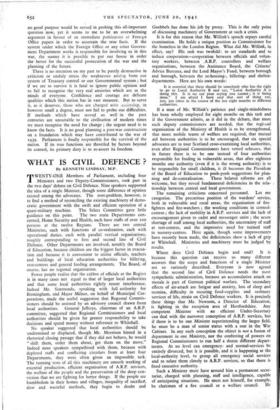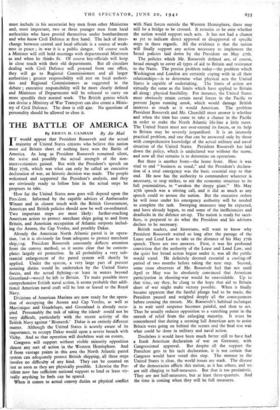WHAT IS CIVIL DEFENCE ?
By KENNETH LINDSAY, M.P.
TWENTY-ONE Members of Parliament, including four Ministers and two Deputy-Commissioners, took part in the two days' debate on Civil Defence. Nine speakers supported the idea of a single Minister, though some difference of opinion existed among the advocates. The root-problem, however, is to find a method of reconciling the existing machinery of demo- cratic government with the swift and efficient operation of a quasi-military machine. The Select Committee gave little guidance on this point. The two main Departments con- cerned, Home Security and Health, each have staffs of over ioo persons at the twelve Regions. There are two central Ministries, each with functions of co-ordination, each with operational duties, each with parallel vertical organisations, roughly corresponding to first and second line of Civil Defence. Other Departments are involved, notably the Board of Education, because children are the biggest factor in evacua- tion and because it is convenient to utilise officials, teachers and buildings of local education authorities for billeting, rest-centres and general feeding arrangements. The Board, of course, has no regional organisation.
Fewer people realise that the calibre of officials at the Region is in many cases not equal to that of larger local authorities and that some local authorities rightly resent interference. Indeed Mr. Simmonds, speaking with full authority for Birmingham, and Major Milner, on behalf of Municipal Cor- porations, made the useful suggestion that Regional Commis- sioners should be assisted by an advisory council drawn from local authorities. General Jeffreys, chairman of an A.R.P. committee, suggested that Regional Cominissioners and local authorities should be given far greater responsibility to take decisions and spend money without reference to Whitehall.
No speaker suggested that local authorities should be undermined or displaced, though Mr. Morrison hinted in a rhetorical closing passage that if they did not behave, he would " shift them, order them about, get them on the move." Indeed most speakers sympathised with them, because with depleted staffs and conflicting circulars from at least four Departments, they were often given an impossible , task. The running tests of all this machinery are smooth working of essential production, efficient organisation of A.R.P. services, the welfare of the people and the preservation of the deep con- viction that we are fighting for better things. If the people see bumbledom in their homes and villages, inequality of sacrifice, slow and wasteful methods, they begin to doubt and Goebbels has done his job by proxy. This is the only point of discussing machinery of Government at such a crisis.
It is for this reason that Mr. Willink's speech repays careful examination. He holds a unique position as Commissioner for the homeless in the London Region. What did Mr. Willink, in effect, say? His task was twofold : to set standards and to induce cooperation—cooperation between officials and volun- tary workers, between A.R.P. controllers and welfare organisations, between the Assistance Board, the Citizens' Advice Bureaux, and the Lord Mayor's Fund, between borough and borough, between the re-housing-, billeting- and shelter- departments. Here are his own words: It is essential that there should be somebody who has the right to go to Local Authority B and say, " Local Authority A is doing this. It is no use your saying you cannot ; it is being done." I am afraid I have said that sort of thing coo, 200, 300 times in the course of the last eight months to different authorities.
If a man of Mr. Willink's patience and single-mindedness has been wholly employed for eight months on this task and if the Government admits, as it did in the debate, that more such deputy commissioners are needed, that the regional organisation of the Ministry of Health is to be strengthened, that more mobile teams of welfare are required, that mutual aid between authorities is to be encouraged, that six special advocates are to tour Scotland cross-examining local authorities, even after Regional Commissioners have vetted schemes, that in future there is to be one instead of four authorities responsible for feeding in vulnerable areas, that after eighteen months one authority (even if it is the wrong authority) is to be responsible for small children, it ill becomes the President of the Board of Education to pooh-pooh suggestions for plan- ning and de-centralisation. These belated reforms are all welcome, but they reveal fundamental deficiencies in the rela- . tionship between central and local government.
The remaining criticisms concerned personnel. Let .me categorise. The precarious position of the wardens' service, both in vulnerable and rural areas, the organisation of fire- fighters and fire-watchers ; the working conditions in control- centres ; the lack of mobility in A.R.P. services and the lack of encouragement given to cadet and messenger units ; the 'acute shortage of staff among local authorities, the uncertainty of staff at rest-centres, and the impressive need for trained staff in nursery-centres. Here again, though some improvements have recently been made, the deficiencies show a lack of grip at Whitehall. Ministries and machinery must be judged by results.
Where does Civil Defence begin and end? It is because this question can receive so many different answers that the scope and functions of a single Minister are so variously described. Everyone is now agreed that the second line of Civil Defence needs the most sympathetic administration, because an accumulative attack on morale is part of German political warfare. The secondary effects of air-attack are fatigue and anxiety, loss of sleep and stamina, difficulty in securing food-supplies and ordinary services of life, strain on Civil Defence workers. It is precisely these things that Mr. Newsom, a Director of Education, is fighting in the reception area of Hertfordshire. Any competent Minister with an efficient Under-Secretary can deal with the narrower conception of A.R.P. services, but if there is to be one Minister superintending the larger field, he must be a man of senior status with a seat in the War Cabinet. In any such conception the object is not a fusion of department in one Ministry, nor the conferring of powers on Regional Commissioners to run half a dozen different depart- ments. At no level can emergency- and normal-services be entirely divorced, but it is possible, and it is happening at the local-authority level, to group all emergency social services and to relate them closely to A.R.P. services, so that there is fixed executive authority.
Such a Minister must have around him a permanent secre- tariat, charged with planning, staff and intelligence, capable of anticipating situations. He must not himself, for example, be chairman of a fire council or a welfare council. He must include in his secretariat key men from other Ministries and, most important, two or three younger men from local authorities who have proved themselves under bombardment and who know Civil Defence at first hand. The lack of inter- change between central and local officials is a source of weak- ness in peace ; in war it is a public danger. Of course such a Minister will still hold meetings with departmental Ministers as and when he thinks fit. Of course key-officials will keep in close touch with their old departments. But all circulars dealing with Civil Defence will proceed from one office, they will go to Regional Commissioners and all larger authorities ; greater responsibility will rest on local authori- ties and Regional Commissioners as suggested in the debate ; executive responsibility will be more clearly defined and Ministers of Departments will be released to carry on more speedily their normal work. The British genius which can devise a Ministry of War Transport can also create a Minis- try of Civil Defence. The door is still ajar. No questions of personality should be allowed to close it.



























 Previous page
Previous page